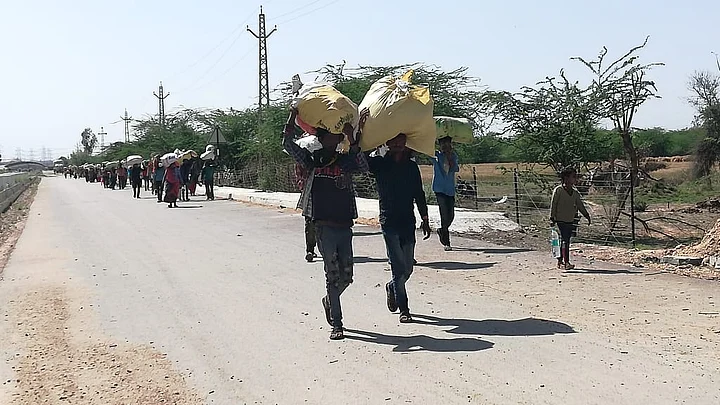"We paid Rs 2 lakh for three private buses to take us from Jaisalmer to our home in Guna in MP, the government had said that migrant workers can go to the borders right? Then why did they stop us?" Banjaras (nomads), about 300 of them, asked after they were removed by the police from the private buses they had hired and stranded on the border of Chittorgarh on 30 March afternoon. When these Banjaras say that the government had said migrant workers would be dropped off at borders so that they can go home, they are not wrong.
While the Rajasthan government had no plans initially to transport migrant workers, after at least 30,000 of them showed up to go home at major bus stops the government arranged for buses to drop them till the border. This lasted for a short window of two-and-a-half days, between second half of 28 March to 30 March as confirmed by officials of the Rajasthan State Road Transport Corporation.
There were various designated points for this, including Mt Abu for Gujarat, Jhalawar for MP and Bharatpur for Uttar Pradesh and Bihar and others. Also, the government only used Rajasthan State buses with the exception of about 30 private buses which were used on 30 March to transport migrant workers from Dohsa to Bharatpur.
But from where these Banjaras came, which is all the way from Fatehgarh block of Jaisalmer where they had gone to cut jeera (cumin), they say they found no such arrangements for transport.
They thought since the government was allowing for people to go home, they should use to the opportunity to spend their money and go home with all their belongings. They paid over Rs 2 lakh, sat in three private buses and set off for home.
They left on 29 March and had traveled for over 460 kilometers when the police stopped them at the Naranpur toll plaza on the afternoon of 30 March. They realised the vehicle had no permissions or passes issued from the authority. Even in the cases migrant workers were being dropped home by private buses, it was on the instructions of the district administration. "The driver who was stopped did not even give us some money back, he just left," they complained.
After getting off the bus, the police told them they cannot leave. This scared the Banjaras who ran away and made their way from the Narayanpur toll plaza to Rodji Ka Kheda, four kilometers away. On the way they wanted to avoid the highway, so they entered a few villages where they were pushed out of and offered no help. "Men stood with lathis and did not let us inside. No one offered food or water or anything. We kept running and walking," they said.
After walking four kilometres, they met Paras Banjara, an activist from Mazdoor Kisan Shakti Sangathan. "They were at least 300 of them, including children who were barely a year old to old men and women in their eighties. They were desperate and very poor. With their utensils, clothes, some medicines, all of it tied in cloth and placed on their heads they walked towards us. We gave them food but they said they did not even want food. They said they will arrange for money to give us as long as we provided them a way to go home."
He also says they were angry and confused as they thought they could go home, as that is what the government had said. But the confusion proved costly for the Banjaras who left work to go home, but were stranded in between. "They told me they would have rather stayed back in Jaisalmer as the cutting of cumin was still happening, so they would have still made some money."
Paras asked them to stay in a government camp, but they were scared and again left for the fields to hide from the police. "I don't know where they are anymore. They were petrified and helpless, they also had no faith in the police or the people. It was like they were in a hostile world desperately doing everything they could to reach home."
(At The Quint, we question everything. Play an active role in shaping our journalism by becoming a member today.)
